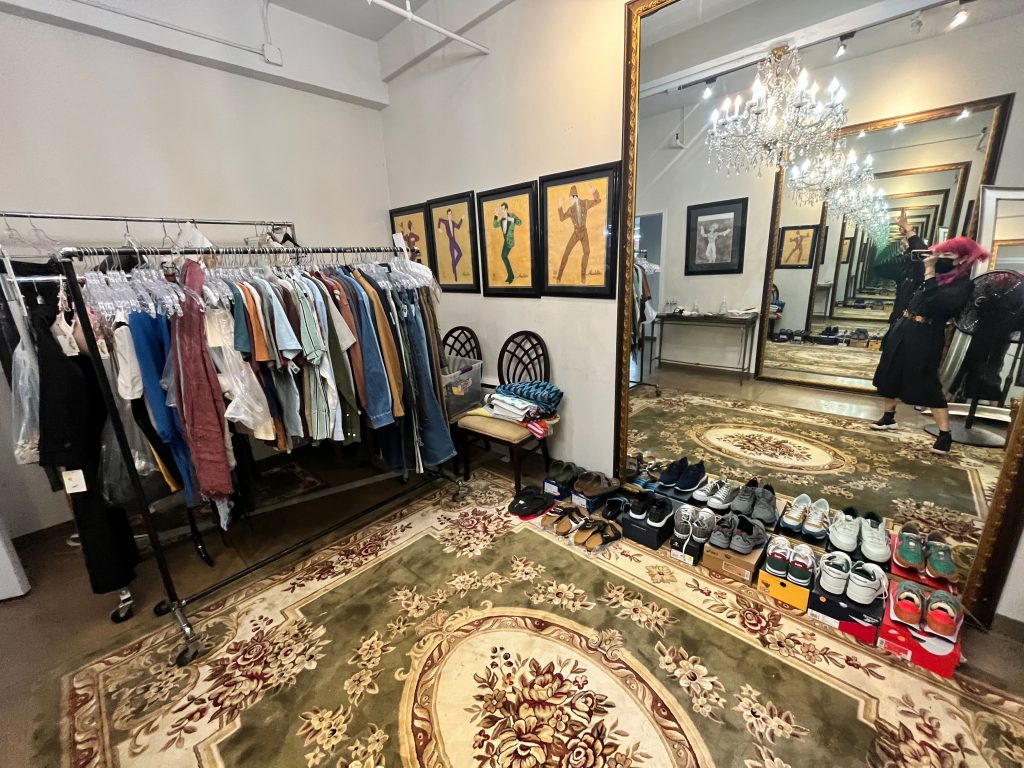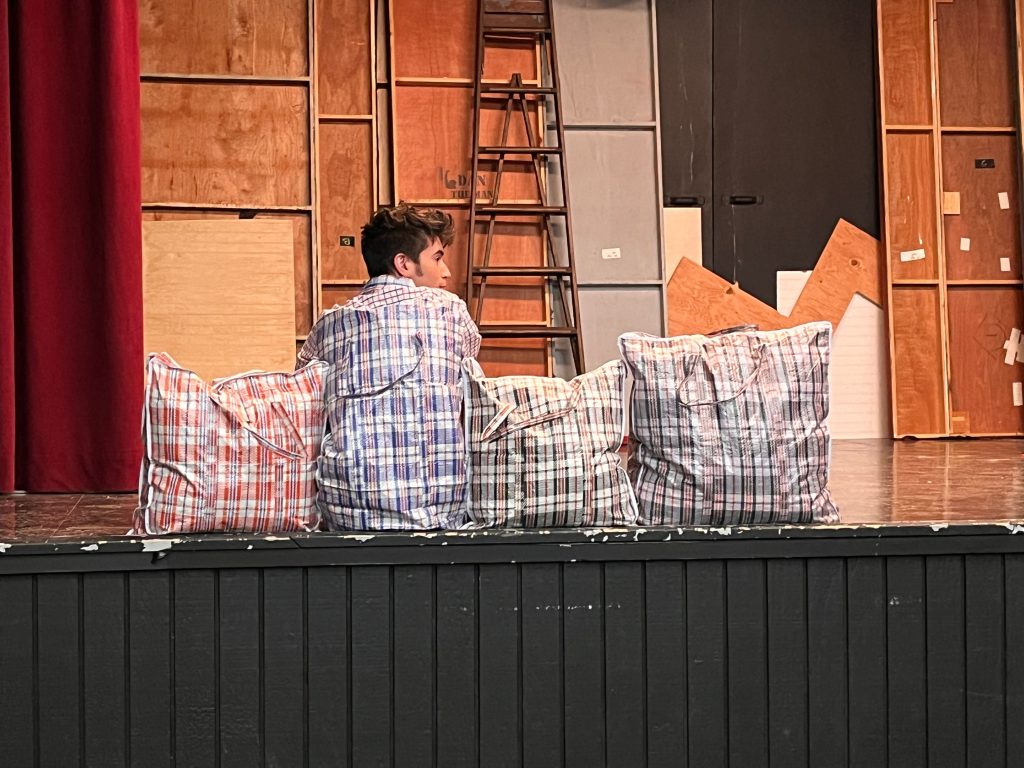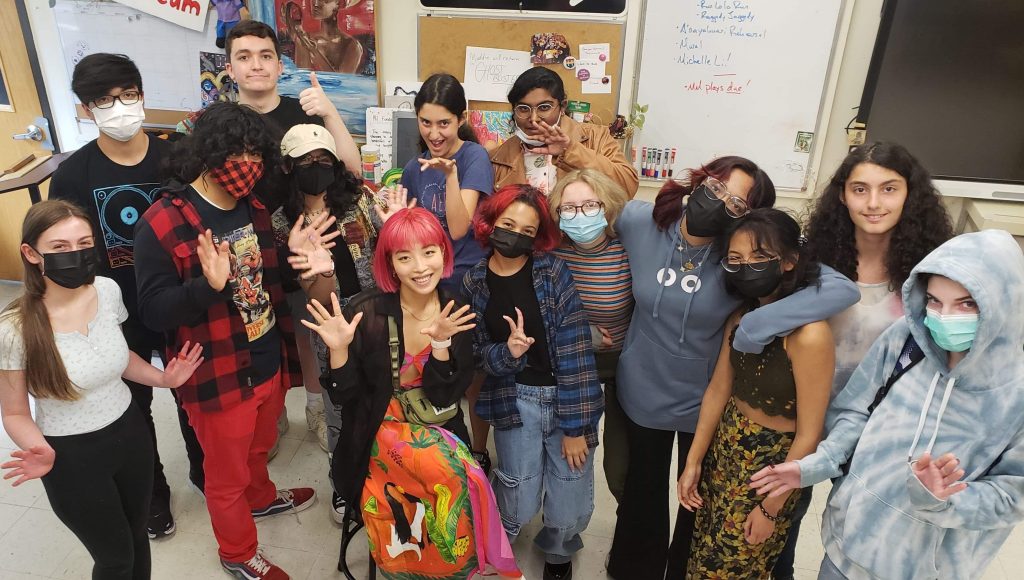
Theater Camp is a celebration of creativity and sincerity. The mockumentary, which is directed by Molly Gordon and Nick Lieberman, shows a theater camp on its last legs and developing what just might be its final musical ever. In a movie filled with artists and a musical which features kids living the good life in Studio 54, costume designer Michelle J. Li helps tell a story both hilarious and personal while defining a range of artsy characters.
Li herself was a theater kid. Over the years, she’s worked on several comedies, including Meet Cute, the darkly comedic Shiva Baby, and the wonderfully silly Awkwafina is Nora From Queens. She has an eye for comedy and can deliver costumes as funny as a razor-sharp line of dialogue. Recently, the costume designer took the time to discuss her fulfilling experience on Theater Camp, including designing costumes for a costume designer and paying homage to the cast of Annie.
Below the Line: Did your high school theater days really came in handy while working on this movie?
Michelle J. Li: Absolutely. I mean, I am really, really happy that you were able to pick up on that. You know, through seeing the authenticity of the costumes, you might be able to tell that. Yes, I do have my days spent in a high school, middle school theater room. Also, being on stage and figuring out things like, is this what I want to do?
I remember my very first time on stage; I think I was in third grade, and I played the Tin Man in The Wizard of Oz [laughs]. I sang my entire solo looking straight at the ground. I was so nervous. But I remember being completely painted head to toe in silver paint as an eight-year-old and sweating so profusely on stage. All of my silver makeup was coming right off [laughs].
BTL: [laughs] Were the costumes any good? How’d you approach that, making the costumes both cheap but good for the campers?
Li: For the costumes that I ended up creating for Theater Camp, of course, within the context of the story, AdirondACTS is supposed to be this underfunded, almost about to be foreclosed-upon theater camp. And so, it was really fun trying to find that balance between, okay, the costumes they’re wearing still have to look like they are designed, but at the same time, it has to also strike that balance of, this is what we’re working with. We don’t have a lot, we’re gonna pull and use whatever we have in order to make it realistic-looking on stage.
BTL: Even for the final musical, telling the story within the story, did you approach it like you would any other narrative?
Li: The entire musical sequence was one of the most challenging parts of putting on the story within the story because, meanwhile, we were shooting the entire feature. We shot it in 19 days. I think that musical sequence, we only had two days to film the entire musical within the musical. Because we were so busy with all of the other aspects of the actual movie, it was augmented in a way.
Normally, if I were to design a stage production, you would get a full list. You would be able to know all the dialogue, the music, the transitions, and what’s happening throughout the entire play, but because we were only ever going to be filming small sections of the musical numbers, we were never meant to see the transitions between the scenes in the actual movie. They never got written.
It was sort of like a haphazard, quickly put-together but very intentional process of, okay, so we know we’re only gonna see the first two, three minutes of this musical number. Knowing that, I’ll have to figure out the costumes for that, but something that we didn’t have to do is figure out like, okay, what does the quick change look like? How does this costume transition into the costume for the next musical number because the camera has cut?

BTL: Did any movies, musicals, or real locations inspire your choices for that musical?
Li: I know that in Studio 54, [it’s] real references to what’s happening in Studio 54. I’m not sure if you know this, but that entire sequence of the three boys all in red and wearing these orange curly wigs, that’s supposed to be a reference to a real-life event that happened at Studio 54. I wanna say, like back in the ’80s, there was the cast of “Annie,” 13-year-olds, Sarah Jessica Parker was there, went to Studio 54. It’s supposed to be an Easter egg reference for the people in the community.
BTL: [laughs] That’s a deep cut. Have you met people picking up on that?
Li: No, because it’s not explicitly referenced in the movie itself, but if you know theater history and the history of Studio 54, you’re familiar. Of course, you have David Geffen as well being mentioned in Studio 54 [in the musical].
BTL: [laughs] Even with the David Geffen role in the musical, how closely did you want to get to his style?
Li: Studio 54 in general was a really, really fun part of the musical sequence to design for because it was a real location. We could look at archival footage and archival photographs of what people looked like back in the time period. For example, what was David Geffen wearing in Studio 54? There are literally photos of him at the club in clothing. I also like it because they’re all real people. I looked up photos of what he looked like when he was younger, and then, we incorporated those elements into these fictitious versions they play on stage as children.
BTL: “Troy Visions sweater,” in particular, is wonderful. How’d you want to help bring that character to life?
Li: For Troy (Jimmy Tatro), my initial approach for him is I wanted to make him look like he was in a state of arrested development, right? He is like this guy who doesn’t really fit in anywhere. He’s trying to be cool with his tech bros and his primo business influencers, but he is kind of missing that mark as well. At the same time, he’s also missing the mark as far as being able to fit in with the theater crowd. And so, he finds himself in this unique position of still being an outsider no matter how hard he’s trying. I wanted to pair that with the fact that he’s Joan’s (Amy Sedaris) kid, so he is living in her shadow at this camp.
I wanted to make him look sort of like an oversized toddler, so you’ll notice that a lot of the silhouette that I’ve been playing with his character is oversized on purpose. There’s also the spin of someone who’s plugged in and a hype beast. We see a lot of familiar brands such as Brain Dead, which I use as a double entendre because that is the opinion the rest of the camp counselors think of this guy as being. So, streetwear brands like Nike and Brain Dead for his Troy Visions sweater. I designed that logo, and it was super fun.
I took a lot of inspiration from current Gen Z branding and what a lot of advertisements are doing for their graphic design. In my mind, Troy consulted with someone to do this logo for himself. The tagline for “Troy Visions,” it’s something along the lines of “build vision” and “create,” right? You have these taglines that don’t really mean anything; it’s just trendy word salad.

BTL: As a costume designer, how satisfying is it for your work to score laughs?
Li: It is really, really satisfying. I grew up on comedy. It is one of my favorite genres to work in because I consume a lot of comedy, and I think that the vehicle of comedy as a genre allows you to explore a lot of topics that you might not necessarily be able to comment on or explore, because they might be too sensitive or subversive.
For this one, in the Sundance version that premiered in January, there were some of my favorite costumes that I created that didn’t make it into this cut, unfortunately. But we had so many inside jokes as far as costumes that would make the audience laugh, because if you were in theater, you know those giant-like rice plaid bags. I don’t know if you’ve ever seen those, but they’re used very frequently to store costumes and to schlep around props. But anyway, the character Glenn (Noah Galvin), the tech director in his class, he’s camouflaged as one of the bags, and the kids are like, “Oh, where’s the teacher?” He’s late to class and he gets up on stage and turns around, and it turns out he’s wearing a shirt made out of the material of these bags. And so, that always got like a huge laugh [laughs].
BTL: The Bob Fosse kids got me.
Li: Totally. I think those are the moments that bring me such delight and joy. It’s when you’re really hitting and able to access the niche of your audience’s interest, and that joke is for them. It’s even more satisfying when your costume hits a home run.
BTL: In your theater days, were there cliques like in the movie?
Li: I think if you went to or were involved in any sort of theater program, you had your techies and then you had your singers. You had the Alto, Sopranos, and you had the people who were going to pursue musical theater versus the actors who were like, “I’m gonna do acting.”
I’m not a musical theater major. I didn’t end up going to a performing arts high school, but I did go to theater college. I was surrounded by a lot of very specific groups and, for lack of a better word, archetypes of individuals depending on what they were studying. And so, it was useful to be able to pull from all of those references.
BTL: How was your experience at Theater College?
Li: So I went to Carnegie Mellon and studied at the School of Drama. Within the School of Drama, we are separated by discipline. I studied specifically costume design in the program. However, my partner is an actor who I met in the program, so I had a lot of exposure to the acting professors or these types of characters. Of course, they’re all heightened within the movie, but they’re really not too far off from the truth.
One of the best parts that I think Theater Camp is able to poke fun at, and it’s only funny because it’s so true, is that every single individual who goes to theater school or theater camp, they’re so serious about their work to the point where it’s almost like, is someone filming?
I think one of the main artistic references that came through was a documentary that was filmed a few years ago called Stagedoor. A lot of that was referenced for the directors’ vision, tonally, but also for me because you do get these groups of people and characters who are just so invested in their craft and perfecting it. When you put that kind of context on kids, who are like eight years old and they’re talking about a life or death situation for them to memorize their lines, that’s comedy.

BTL: What are particularly intense days on a film or theater production?
Li: So I am actually designing a very, very small play downtown at the Soho Playhouse in New York City.
BTL: Congratulations.
Li: Thank you very much. And so, I actually don’t have an answer for you for the professional side of, like, designing for theater, because this will be my first one. I dived right into working in film and television after I left school. But a very intense workday for television or film, the longest days that do happen, I might wake up at like 5:35 in the morning. If we have fittings on the day before we go to set, I’ll have to wake up, get to work, go to set, and have fittings with the day players for the episode. That probably happened around six or so in the morning.
After that, I’ll go to the office, which might involve more fittings and doing research and going shopping and organizing what the next creative deck is going to be for the upcoming days of shooting or upcoming episodes, and meeting with the new director who’s coming in to do the episode. And then hopefully I’ll have lunch. And then between that, I would say it probably wraps up around 6:30 PM or 7:00 PM, if I’m lucky. Sometimes it’ll go until 8:30 PM. The days are really long, but when you’re having fun, it kind of goes pretty quickly.
BTL: For Theater Camp, what was a particularly fulfilling day on set?
Li: One of the best days that happened on theater camp was one of the days when we were actually filming the [Studio 54] musical sequence. It was incredible because you get to see all of the hard work that you’ve labored over. Maybe there is blood, sweat, and tears involved, but you are able to gain a sense of relief and also pride in work when your fellow crew members and castmates are coming up to you and whispering in your ear, “Oh my God, it looks so good.” They’re actually having their minds blown in real-time looking at your costumes, they’re looking at the hair and makeup on the set, and asking, “How the hell did you pull that off? This is why we hired you.”
BTL: How personal or fun did it get designing costumes for the costume designer in the film?
Li: It was an opportunity of a lifetime – the opportunity to poke fun and make something very tongue-in-cheek. For Gigi (Owen Thiele), the costume designer, I wanted him to have these elements of what people think stereotypically when they’re like, “Oh, this person’s a costume designer.” So, having clothing that feels like power clashing and patterns, you know, transcending heteronormative ways of dressing was important to me too, because a lot of our community is made up of people who are queer and who identify as LGBTQIA+.
I also wanted to emulate things I do in my real life as a costume designer, which is I support local brands and support up-and-coming designer friends who are maybe trying to start their own labels and things. So, Gigi is actually wearing some pieces from my friends who are fashion designers. And so, being able to support their work as independent labels, but also giving them the platform, it was super, super special.

BTL: I feel like we can have expectations of costume designers to look great. In your experience, are most costume designers fashionable or stylish individuals?
Li: It runs the gamut. Some people are, and some people aren’t. I think costume design is about finding the character and its believability and the story arc that a character has. And so, I don’t think that you necessarily have to be on point all the time in order to sell yourself or brand yourself as a successful costume designer. I also have heard many of my friends say things like, “I’m so busy working on the characters and making sure they look great. I’m not spending an ounce of energy on myself because it’s all going towards the characters.”
BTL: What do you hope to accomplish in the future?
Li: Something that was really illuminating to me after working on Nora From Queens was I’m really keen on expanding my design work to encompass and involve more Asian-American stories because I think a lot of Asian-American media – we’re having a moment right now. I would love to be a part of that and be able to work on stories like Beef or Past Lives, where you have Asian-American filmmakers in front of the camera, behind the scenes on all creative levels.
You know, I was able to connect and feel these characters on a level that I didn’t know was something I was looking for or missing until I did Nora From Queens. So, that is something I would like to continue seeking out. Potentially, I would love to work on some more comedy and drama, and maybe even some opportunities for high fantasy and sci-fi.
Theater Camp is now playing in theaters.






